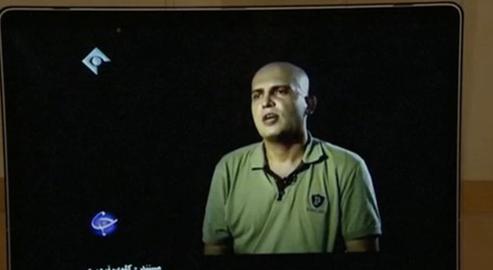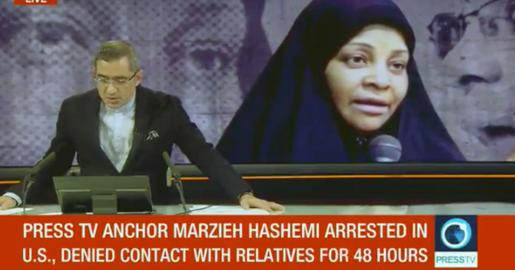In his exclusive interview with IranWire, Mazyar Ebrahimi, one of several people the Iranian regime falsely accused of assassinating four nuclear scientists, revealed the extent of the trauma he endured during his imprisonment in Iran. Today, living in Europe and hoping to be granted asylum, Ebrahimi has recounted the harrowing details of the physical and psychological torture he had to endure at the hands of prison officials.
One of the most heart-wrenching details of his imprisonment were the forced confessions he made under duress. Ebrahimi was forced to confess to being responsible for the killing of nuclear scientists, despite having had no involvement. Professionally, Ebrahimi had been a representative for European and US manufacturers of sound and video equipment, and Islamic Republic of Iran Broadcasting (IRIB) was one of his clients. In Ebrahimi’s own words, “It was corruption at IRIB and the competition from another IRIB contractor that led to my arrest.”
Ebrahimi also provided IranWire with a list of companies whose products are used by the Iranian government. While none of these companies have any official representatives in Iran and do not knowingly sell their products to Iranian state TV or other related institutions, Ebrahimi noted that the equipment manufactured by these companies is available through dealers in the Middle East and southeast Asia.
Given the prevalence of forced confessions orchestrated by the Iranian regime and the preponderance of such equipment being used by the Iranian state TV, IranWire contacted these companies to ask them about their operations in Iran and about whether they were aware that their brand was being used in Iran to extract forced confessions from political prisoners.
“Islamic Republic of Iran Broadcasting (IRIB) is not our direct client”
Out of the 26 companies whose equipment are known to have been used by the IRIB, only a handful have responded to our inquiry. Ross Video based in Canada responded by saying, “If our equipment is in use in Iran, it was either sold a long time ago before export controls, or shipped illegally completely beyond our knowledge and control. It would also be unsupported by Ross Video as no spare parts can be shipped to Iran.” The representative for Ross Video further noted, “we always ask for end user information and prevent the sale of our equipment to Iran that might otherwise be transported illegally across borders. I cannot speak for other companies in our industry, which may not have comparable safeguards or ethics, but I can assure you that we fully comply with all of the US and Canadian export laws that prohibit the sale of our equipment to Iran.”
A similar argument was put forward by the other companies that responded to IranWire. A representative from Dedolight, a German company, said, “I am not aware that we sold any piece of equipment directly to Iran for several years now. We have representatives in over 70 countries, and they internally work with local dealers. Most of those are not even known to us. So it is quite possible that some piece of equipment may find its way.” A Blackmagic Design representative said, “I can confirm that Blackmagic Design does not sell to the Iranian market.”
Raising the fact that sanctions were in place to prevent the sale of certain equipment to Iran, a Sennheiser representative responded by saying, “Of course, we only supply customers directly who have been checked against applicable sanction lists and fulfill all pertinent export regulations. All products that are sold to Iran are checked for export compliance and adhere to all applicable regulations.” The same representative also stressed that IRIB was not amongst their “direct clients.”
IRIB’s ability to procure such equipment despite the fact that these companies categorically deny directly selling them to Iran raises questions about the scope and effectiveness of sanctions currently in place. IranWire interviewed a sanctions lawyer, who, for professional purposes, has requested to remain anonymous.
Interview with a Sanctions Lawyer
Against the backdrop of IRIB’s consistent ability to procure equipment manufactured by these companies, one of the questions that naturally comes to mind is whether sanctions can ever prevent IRIB from obtaining such equipment. The sanctions expert we interviewed noted that, by law, US companies are not allowed to send equipment to Iran. Sanctions laws and export control are in place, especially when it comes to Iran. The expert noted that the ability for American companies to sell these items even indirectly to Iran is almost non-existent due to these strict laws. However, many European or Asian companies are still able to sell them indirectly to Iran.
How could this trend be prevented? The expert said that various methods could be deployed to flag up potential sanction violations. The larger and the more sensitive the item, the more difficult it is to sell to Iran. If some unknown company from, say, the United Arab Emirates, Georgia, Armenia, or Turkey orders 40 pieces of equipment, the manufacturer would typically ask what purpose they will be used for. So, in that respect, as noted by the sanctions expert, the manufacturers have “red flags” in place that identify intentions to sell equipment to another company prior to the sale taking place. However, this still leaves the door open for small purchases by third-party companies that can potentially deliver equipment to Iran.
While laws in the US are quite strict when it comes to selling equipment to Iran, what about the laws in Europe? The sanctions expert underscored that banks in Europe, as well as many of the larger companies, tend to follow the US’ lead on the matter. For example, if IRIB is on the US sanctions list, no credible European bank will facilitate the transaction, even if it is not on the EU sanctions list. Big companies are likely to avoid the hassle of getting in trouble in order to safeguard their business in the United States.
It must be borne in mind that IRIB faced a set of sanctions under the Obama administration, especially for its role in crushing dissent. However, ever since the nuclear talks that led to the Joint Comprehensive Plan of Action (JCPOA) being signed, IRIB has been receiving waivers every six months, allowing it to be granted capacity to broadcast its content abroad. In fact, IRIB has been granted waivers every six months since 2013.
What can Ebrahimi do to Seek Justice?
So are there channels that Ebrahimi can use to seek justice within criminal law? IranWire interviewed human rights lawyer Gissou Nia, an Iran analyst at the Atlantic Council, on the subject.
Nia says it is important to “first acknowledge that domestic options through Iran’s legal system are off the table”. She notes that after his release, “Ebrahimi filed a complaint against the MOIS [Ministry of Intelligence and Security] and IRIB and several newspapers that falsely accused him of being an Israeli spy. However, that came to no avail as Ebrahimi was then cautioned, and possibly even threatened, to withdraw the complaint.”
However, filing a complaint from abroad could be an option. Since Ebrahimi has claimed asylum in Germany, Nia notes, “there are other legal options potentially available to him, pursuant to laws that seek to ensure that even crimes that are committed elsewhere do not go unpunished. In respect to criminal litigation options, Germany is one of the few remaining countries that has genuine universal jurisdiction for some crimes – meaning that charges can be pressed no matter where the crimes were committed. In looking at the responsibility of officials in the MOIS, German prosecutors could pursue the claim of torture as an underlying offense of crimes against humanity perpetrated against Ebrahimi and other former Iranian political prisoners now residing in Germany who were victims of forced confessions.”
Yet filing a complaint from Germany has its own share of challenges, deriving from the extreme caution exercised by Germany and a lack of political will on behalf of German officials, who do not want to hamper their relations with Iran. As noted by Nia, while the accused need not be present in Germany when the court case is lodged and investigations get underway, a trial cannot be initiated without the accused appearing before the court. This presents a challenge due to the limited access Islamic Republic officials have to inter-European travel. Even where an official – whether a current or former official – has traveled to Germany in recent years and supporting evidence for charges has been provided, German prosecutors have proceeded cautiously when it comes to issuing arrest warrants, most likely due to concerns over diplomatic ties. The reluctance to prosecute, even where a valid dossier that meets the evidentiary threshold exists, underscores the need for greater political will to prioritize the prosecution of these crimes, and to encourage extraditions from countries that Iranian officials do frequent.”
Other Options Outside Criminal Prosecution
Ebrahimi can also look to punish IRIB for its involvement in his forced confessions. Nia argues that it is possible to “look to [the] civil liability of the IRIB, or any corporations that support these activities.” She points out that IRIB broadcasts in Germany in the German language, and that this could offer leverage. “There are legal instruments that allow plaintiffs in the European Union to establish the civil liability of corporations for human rights violations committed outside the EU. Depending on how the German version of IRIB is incorporated, that could be an option. Another option could be at play if the German version of IRIB aired Ebrahimi’s forced confession. If so, former Iranian political prisoners in Germany could bring suit, alleging that the harm occurred in Germany because the IRIB’s airing of this forced confession was intended to intimidate members of the Iranian opposition from expressing their peaceful views, or because the airing re-traumatized those who are also the victims of forced confessions.”
If IRIB in Germany language is found to have aired Ebrahimi’s forced confession, what can be done to seek redress? Gissou Nia notes that one could also “simply pursue a regulatory outcome by getting IRIB in the German language off the air.
Press TV, a documentary network associated with the IRIB, was already taken off the airwaves in Germany back in 2012, following an Ofcom ruling to take Press TV off the air in the UK. While IRIB’s German language service is officially accredited with Germany’s Federal Press Office, IRIB's legitimacy has come into question with the decision of a museum to not allow IRIB on their grounds earlier this year. At the time, German institutions were divided on whether this infringed on press freedom, but given the new revelations concerning Ebrahimi and the way that IRIB conducts itself when it comes to forced confessions, there could be a fresh challenge to its legitimacy to air in Germany.”
Read more about the Ofcom ruling to take Press TV off air, which was initiated by Maziar Bahari, the founder and editor of IranWire
Watch Maziar Bahari's film Forced Confessions
visit the accountability section
In this section of Iran Wire, you can contact the officials and launch your campaign for various problems



























comments